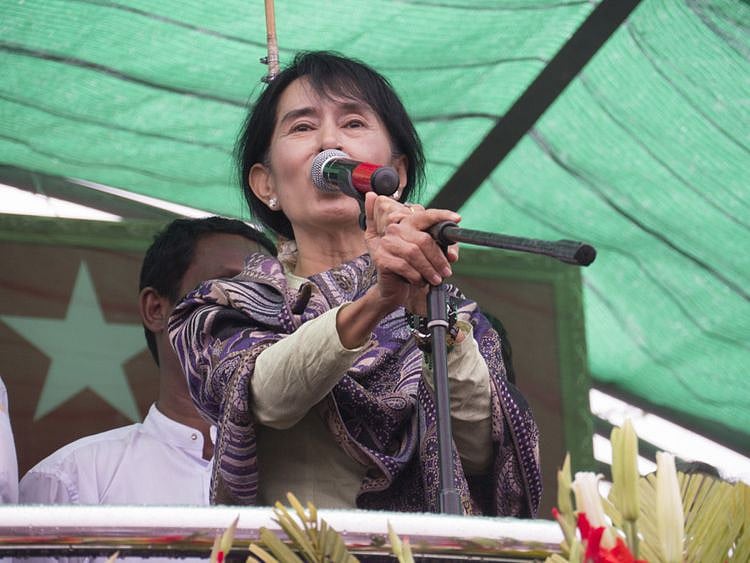The London based human right organisation Amnesty International (AI) has again criticised Myanmar under Aung San Suu Kyi, “where the slightest criticism of authorities can land you in jail.”
Amnesty added that, “after campaigning for human rights for decades and paying a high price for their own activism, it is shocking that Aung San Suu Kyi and her colleagues have done so little to change military-era laws that are still being used to repress and punish critics.”
Two months ago the city of London voted to revoke the honour of “freedom of the city” granted to Ms. Suu Kyi three years back for her non-violent struggle for democracy and justice in her country.
The move followed her personal appearance at the International Court of Justice (ICJ) in The Hague to defend Myanmar’s military against allegations of rape, arson and mass killings against Rohingya victims.
A lawsuit has also been filed against her recently in Argentina where she has been accused of complicity in genocidal campaign against Rohingya that eventually led to nearly 750,000 Rohingya seeking refuge in neighbouring Bangladesh.
Buddhist-majority Myanmar has long considered the Rohingya to be “Bengalis” from Bangladesh even though their families have lived in the country for generations. Nearly all have been denied citizenship since 1982, effectively rendering them stateless. Consequently, they are stripped of civic rights and denied freedom of movement.
Suu Kyi, daughter of Myanmar’s independence hero, General Aung San, spent much of her time between 1989 and 2010 in some form of detention, seeking democracy in her military ruled country. Her dogged resistance against the military made her an international symbol of struggle for human rights, winning her Nobel Peace Prize in 1991.
Majority in parliament
And when openly contested elections were held in 2015, she led her National League for Democracy (NLD) to majority in the parliament.
But since coming to power in 2016 in a quasi-civilian set up in Myanmar, she has chosen to defend the military crackdown against the Rohingya and has not been able to show movement towards democratisation in Myanmar.
When the 2015 elections brought NLD to power, she assumed the extra-constitutional position of ‘state counsellor,’ under a system still dominated by the military.
She was barred from becoming the president because the 2008 constitution disqualified those with foreign national spouses and children for office of the head of state. Her late husband and her children are British nationals.
Outraged by the atrocities against the Rohingya and continued crackdown against dissent by the powerful military, many international leaders who earlier supported her, have now come up against her stance. Calls to strip her of the Nobel Peace Prize continue. It is a fall from grace for this once-towering figure that few could have predicted.
People who have worked closely with her believe that behind the closed doors she is authoritarian, refusing to delegate, obsessive about control and is driven more by her determination to “continue the legacy of her father, General Aung San” who is also known as the father of modern day Myanmar.
Her transformation from a human rights icon to someone who defends, what is arguably labelled as, genocide has indeed been a shock to her supporters.
Colluded with the Junta
Alluding that her position against Rohingya may be reflective of overwhelming opinion against Islam within Myanmar, Peter Popham, who has written two books on Suu Kyi, believes that “she has just gone along with it.” He bases his opinion on the fact “the NLD rejected” some very capable Muslim candidates” for elections held in 2015.
With an eye on general elections due this year Suu Kyi’s NLD has moved several proposals during the last twelve months to amend the constitution seeking reduction in military’s influence over the state affairs.
Since the military controls 25 per cent of the assembly seats only one out of nineteen — a rather innocuous amendment passed the parliament. It remains business as usual in Myanmar.
Many observers were skecptical of military’s intent to democratise through 2015 elections. They mistakenly hoped that with a parliamentary majority Suu Kyi will at least bring in a sembalence of political freedom in Myanmar. None of this happened. The military has not loosened its grip.
By co-opting her in a quasi democratic arrangement, the military seem to have played its cards well to acquire international acceptance and aid following increasing pressure from the UN, ASEAN, US, EU and other international players.
Once into the power structure she finds that she has no power to make change from within and also in a position from which it is impossible for her to walk back. Though the last word in the story is yet to be written, expectations placed on her were unrealistically high.
Sajjad Ashraf served as an adjunct professor at the Lee Kuan Yew School of Public Policy, National University of Singapore from 2009 — 2017. He was a member of Pakistan Foreign Service from 1973 — 2008 and served as Pakistan’s consul general in Dubai during the mid 1990s
Sign up for the Daily Briefing
Get the latest news and updates straight to your inbox
Network Links
GN StoreDownload our app
© Al Nisr Publishing LLC 2026. All rights reserved.
